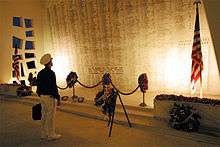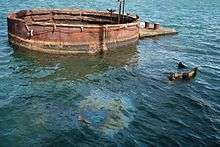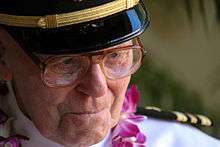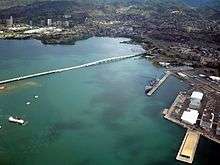USS Arizona Memorial
| USS Arizona Memorial | |
|---|---|
|
IUCN category V (protected landscape/seascape) | |
|
USS Arizona Memorial. | |
| Location | Pearl Harbor |
| Nearest city | Honolulu, Hawaii |
| Coordinates | 21°21′54″N 157°57′0″W / 21.36500°N 157.95000°WCoordinates: 21°21′54″N 157°57′0″W / 21.36500°N 157.95000°W |
| Area | 10.50 acres (4.25 ha) |
| Established | 30 May 1962 |
| Visitors | 1,556,808 (in 2005) |
| Governing body |
U.S. Navy National Park Service |
_burning_after_the_Japanese_attack_on_Pearl_Harbor_-_NARA_195617_-_Edit.jpg)
The USS Arizona Memorial, located at Pearl Harbor in Honolulu, Hawaii, marks the resting place of 1,102 of the 1,177 sailors and Marines killed on USS Arizona (BB-39) during the Japanese surprise attack on Pearl Harbor on 7 December 1941 and commemorates the events of that day. The attack on Pearl Harbor and the island of Oʻahu was the action that led to the United States' direct involvement in World War II.
The memorial, built in 1962, is visited by more than two million people annually.[1] Accessible only by boat, it straddles the sunken hull of the battleship without touching it. Historical information about the attack, shuttle boats to and from the memorial, and general visitor services are available at the associated USS Arizona Memorial Visitor Center, which opened in 1980 and is operated by the National Park Service. The sunken remains of the battleship were declared a National Historic Landmark on 5 May 1989.[2]
Memorial
_wreck_in_the_1950s.jpg)
Conception and funding
During and following the end of World War II, the Arizona's wrecked superstructure was removed and efforts began to erect a memorial at the remaining submerged hull. The Pacific War Memorial Commission was created in 1949 to build a permanent memorial somewhere in Hawaiʻi. Admiral Arthur W. Radford, commander of the Pacific Fleet attached a flag pole to the main mast of the Arizona in 1950 and began a tradition of hoisting and lowering the flag. In that same year a temporary memorial was built above the remaining portion of the deckhouse.[3] Radford requested funds for a national memorial in 1951 and 1952 but was denied because of budget constraints during the Korean War.
The Navy placed the first permanent memorial, a ten-foot-tall basalt stone and plaque, over the mid-ship deckhouse on December 7, 1955.[4] President Dwight D. Eisenhower approved the creation of a National Memorial in 1958. Enabling legislation required that the memorial budgeted at US$500,000 be privately financed; however, $200,000 of the memorial cost was actually government subsidized.
Principal contributions[5] to the memorial included:
- $50,000 Territory of Hawaiʻi initial contribution in 1958
- $95,000 privately raised following a 1958 This Is Your Life television segment featuring Rear Admiral (ret.) Samuel G. Fuqua,[6] Medal of Honor recipient and the senior surviving officer from USS Arizona
- $64,000 from 25 March 1961 benefit concert by Elvis Presley
- $40,000 from the sale of plastic models of the Arizona in a partnership between the Fleet Reserve Association and Revell Model Company
- $150,000 from federal funds in legislation initiated by Hawaii Senator Daniel Inouye in 1961
During planning stages, the ultimate purpose of the memorial was the subject of competing visions. Some were eager to keep it a tribute to the sailors of the Arizona, while others anticipated a dedication to all the war dead of the Pacific theater.[7] In the end, the legislation authorizing and funding the memorial (HR 44, 1961) declared that the Arizona would "be maintained in honor and commemoration of the members of the Armed Forces of the United States who gave their lives to their country during the attack on Pearl Harbor, Hawaii, on December 7, 1941."[7]
Design
The national memorial was designed by Honolulu architect Alfred Preis who had been detained at Sand Island at the start of the war as an enemy of the country because of his Austrian birth.[8] The United States Navy specified that the memorial be in the form of a bridge floating above the ship and accommodating 200 people.
The 184-foot (56 m)-long structure has two peaks at each end connected by a sag in the center of the structure. It represents the height of American pride before the war, the sudden depression of a nation after the attack and the rise of American power to new heights after the war. Critics initially called the design a "squashed milk carton".[9]
The architecture of the USS Arizona Memorial is explained by Preis as, "Wherein the structure sags in the center but stands strong and vigorous at the ends, expresses initial defeat and ultimate victory ... The overall effect is one of serenity. Overtones of sadness have been omitted to permit the individual to contemplate his own personal responses ... his innermost feelings."[10]
Description

— inscription in marble with the names of Arizona's honored dead
There are three main parts to the national memorial: entry, assembly room, and shrine. The central assembly room features seven large open windows on either wall and ceiling, to commemorate the date of the attack. The total number of windows is 21. Rumor says this symbolically represents a 21-gun salute or 21 Marines standing at eternal parade rest over the tomb of the fallen, but guides at the site will confirm that this was not the intention of the architect. The memorial also contains an opening in the floor overlooking the sunken decks. It is from this opening that visitors come to pay their respects by tossing flowers in honor of the fallen sailors. In the past, leis were tossed in the water, but because string from leis poses a hazard to sea life, leis now are placed on guardrails located in front of the names of the fallen.
One of the three 19,585-pound anchors of the Arizona is displayed at the entrance of the visitor center. (One of the other two is at the Arizona State Capitol in Phoenix.) One of the two ship's bells is in the visitor center. (Its twin is in the clock tower of the Student Memorial Center at the University of Arizona in Tucson.)
The shrine at the far end is a marble wall that bears the names of all those killed on the Arizona, protected behind velvet ropes. To the left of the main wall is a small plaque which bears the names of thirty or so crew members who survived the 1941 sinking. Any surviving crew members of the Arizona (or their families on their behalf) can elect to have their ashes interred within the wreck, by U.S. Navy divers [11]
History
The USS Arizona Memorial was formally dedicated on 30 May 1962 (Memorial Day) by Texas Congressman and Chairman of Veteran Affairs Olin E. Teague and Hawaiʻi Governor John A. Burns.
It was listed on the National Register of Historic Places on 15 October 1966. While the actual wreck of USS Arizona was declared a National Historic Landmark in 1989, the memorial itself does not share in this status. Rather, it is listed separately from the wreck on the National Register of Historic Places. The joint administration of the memorial by the United States Navy and the National Park Service was established on 9 September 1980.

Oil leaking from the sunken battleship can still be seen rising from the wreckage to the surface of the water. This oil is sometimes referred to as "the tears of the Arizona"[12][13] or "black tears."[14] In a National Geographic feature published in 2001, concerns were expressed that the continued deterioration of the Arizona's bulkheads and oil tanks from saltwater corrosion could pose a significant environmental threat from a rupture, resulting in a significant release of oil.[15] The National Park Service states that it has an ongoing program closely monitoring the condition of the submerged vessel.
The Park Service, as part of its Centennial Initiative celebrating its 100th anniversary in 2016, is developing a "mobile park" to tour the continental United States to increase exposure of the park. The mobile park will also collect oral histories of the attack on Pearl Harbor.[16]
USS Missouri
In 1999, the battleship USS Missouri was moved to Pearl Harbor from the United States west coast and docked behind, and in line, with the USS Arizona, placing it perpendicular to the USS Arizona Memorial. Upon the deck of USS Missouri in Tokyo Bay, the Japanese surrendered to United States General Douglas MacArthur and Admiral Chester W. Nimitz, ending World War II. The pairing of the two ships became an evocative symbol of the beginning and end of the United States' participation in the war.
USS Arizona Memorial staff initially criticized the placement of the Missouri, saying the large battleship would "overshadow" the Arizona Memorial. To help guard against this perception, Missouri was placed well back of the Arizona Memorial, and positioned in Pearl Harbor in such a way as to prevent those participating in military ceremonies on Missouri's aft decks from seeing the Arizona Memorial. The decision to have Missouri's bow face the Memorial was intended to convey that the Missouri now watches over the remains of the Arizona so that those interred within the Arizona's hull may rest in peace. These measures have helped preserve the individual identities of the Arizona Memorial and the Missouri Memorial, thereby improving the public's perception of having both Arizona and Missouri in the same harbor.[17]
Visiting the memorial

The Visitor Center operated by the National Park Service is free to the public and has a museum with exhibits about the Pearl Harbor attack, such as the ship's bell from the Arizona.
Access to the USS Arizona Memorial is by U.S. Navy boat, for which a numbered ticket, obtained at the Visitor Center and valid for a designated departure time, is required. The memorial is visited by more than one million people annually.[1] Because of the large number of visitors and the limited number of boat departures, the 4,500 tickets available each day are often fully allocated by mid-morning.[18] Before boarding the boat for the short trip to the Memorial, a 23-minute documentary film depicting the attack on Pearl Harbor is presented. Touring of the Memorial is self-guided. The National Park Service Web site provides visitor information, including hours of operation and ticketing advisories.

A one-hour audio tour of the Memorial and Center exhibits, narrated by actress Jamie Lee Curtis, whose father is a World War II and Navy veteran, is available for rent at the Visitor Center. On the Center's grounds along the shoreline are more exhibits and a "Remembrance Circle". Nearby is USS Bowfin, a World War II Diesel submarine, which may be toured with separate, paid admission. The battleship USS Missouri and the Pacific Aviation Museum Pearl Harbor may also be visited, but require a bus ride to Ford Island.
Every President of the United States since Franklin D. Roosevelt has visited the site.
Honors
_manning_rails_for_USS_Arizona.jpg)
Every United States Navy, Coast Guard, and Merchant Marine vessel entering Pearl Harbor participates in the tradition of "manning the rails". Personnel serving on these ships stand at attention at the ship's guard rails and salute the USS Arizona Memorial in solemn fashion as their ship slowly glides into port. More recently, as foreign military vessels are entering Pearl Harbor for joint military exercises, foreign troops have participated in the traditional manning the rails.
The Arizona is no longer in commission, but is an active U.S. military cemetery. As survivors of the attack on the Arizona pass away, many choose to have their ashes either scattered in the water over the ship, or have their urns placed within the structure of the ship reserved for the purpose.[19] As a special tribute to the ship and her lost crew, the United States flag flies from the flagpole, which is attached to the severed mainmast of the sunken battleship.[20]
The Arizona memorial is one of the nine major historical sites incorporated into the wide-ranging World War II Valor in the Pacific National Monument, established by Congress in 2008 and dedicated on 7 December 2010.[8]
See also
- USS Utah (BB-31) wreck of ship lost at Pearl Harbor and memorial
- U.S. Navy museums (and battleship museums)
- USS Arizona salvaged artifacts
References
- 1 2 "Remembering Pearl Harbor: The USS Arizona Memorial". U.S. National Park Service. Archived from the original on 15 March 2008. Retrieved 2008-05-09.
- ↑ "Arizona, USS (battleship) (shipwreck)". National Historic Landmark summary listing. National Park Service. Retrieved 2008-06-21.
- ↑ After The Battle magazine, Issue 38
- ↑ Bergman, p. 37.
- ↑ Arizona Memorial Museum Association. "Creating the Memorial". AMMA website. Retrieved 2009-10-08.
- ↑ "Samuel Glenn Fuqua". Recipients, World War II (A-F). Medal of Honor. United States Army Center of Military History. 16 July 2007.
- 1 2 Bergman, Teresa (2013). Exhibiting Patriotism: Creating and Contesting Interpretations of American Historic Sites. Left Coast Press. p. 39. ISBN 9781598745979.
- 1 2 Bergman, p. 36.
- ↑ Treena Shapiro (27 May 2002). "Arizona Memorial seen as a dedication to peace". Honolulu Star-Bulletin.
- ↑ "USS Arizona Memorial - History & Culture". National Park Service. 18 September 2006.
- ↑ "USS Arizona Interments". USS Arizona Preservation Project 2004. 18 December 2007. Retrieved 5 December 2011.
- ↑ Horst Bendzulla. "The Tears of the Arizona". Artist's website. Retrieved 2009-10-08.
- ↑ Christine Hansen (September–October 2007). "Little Big Store". Hana Hou! Vol. 10, No. 4. Retrieved 2009-10-08.
- ↑ Tritten, Larry (7 December 2003). "`Black Tears' Still Shed For U.S.S. Arizona". South Florida Sun-Sentinel. Retrieved 28 November 2011.
- ↑ "Oil and Honor at Pearl Harbor". National Geographic. June 2001. Retrieved 2008-01-02.
- ↑ Bomar, Mary A. (August 2007). "Summary of Park Centennial Strategies" (PDF). National Park Service. Retrieved 2008-02-15.
- ↑ Gregg K. Kakesako (15 October 1997). "Will ‘Mighty Mo’ be too much?". Honolulu Star-Bulletin.
- ↑ "Plan Your Visit (USS Arizona Memorial)". National Park Service. Retrieved 2008-04-04.
- ↑ "Burials at Sea on the USS Arizona". Retrieved 2015-09-01.
- ↑ "USS Arizona Memorial (National Park Service website)". Retrieved 2010-05-09.
External links
| Wikimedia Commons has media related to USS Arizona Memorial. |
- Official website
- Interactive USS Arizona Memorial, search the memorial for names
- USS Arizona Memorial Museum Association
- Battleship Missouri Memorial
- Pacific Aviation Museum Pearl Harbor
- "Remembering Pearl Harbor:The USS Arizona Memorial", a National Park Service Teaching with Historic Places (TwHP) lesson plan
- High resolution, zoomable panorama taken inside the Arizona Memorial
- A Memorial Day to Remember
- Historic American Engineering Record (HAER) No. HI-13, "USS Arizona, Submerged off Ford Island, Pearl Harbor, Honolulu, Honolulu County, HI"
| ||||||||||||||||||||||||||
| ||||||||||||||||||||||||||||||
.jpg)
